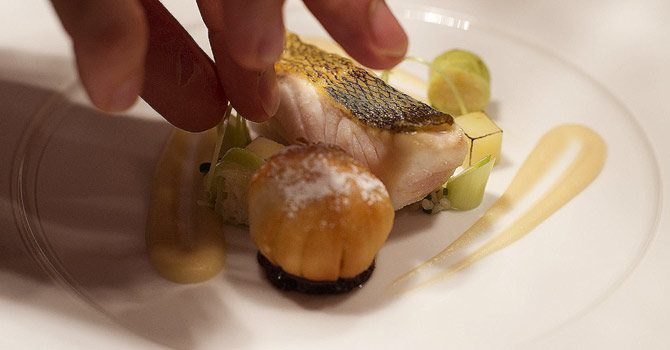
GERMANY: Beyond the cliches of Bratwurst, beer festivals and discount supermarkets, Germany has built up a world class haute cuisine, even if many Germans still prefer to spend cash on their car rather than eating out.
Second only to France at the European level since 2007 in terms of distinctions in the prestigious Michelin guide, Germany boasted nine restaurants with three stars in this year's guide.
It has also seen its two-starred restaurants increase to 32, or 10 more than last year, while the number of establishments that have been awarded one star in the world's number-one food guide also rose.
And the restaurants concerned are no longer based mainly in the south of the country which has a more established gastronomic tradition, but are found increasingly in northern Germany and Berlin.
“Germany has never had such well made and ambitious cooking as today,”Madeleine Jakits, chief editor of the German monthly food magazine, Der Feinschmecker, said.
The secret, she said, was that German chefs had pushed the boundaries of basic haute cuisine.
“They, of course, learnt on the basis of French cuisine but they have freed themselves from it” and gathered new influences by working in far-flung places such as Singapore or Dubai, she said.
And now they produce haute cuisine using German products, she added. Robert Oppeneder, president of the German Chefs' Association (VKD), also sees several reasons to be proud about the way German cuisine has developed.
“Our restaurateurs have more confidence in themselves,” he said.
“Regional cuisine is just as varied as in France and when you throw in a touch of the international, it's sublime,” he commented.
Frank Rosin, 45, is one of this new generation of German chefs.
His restaurant in Dorsten, in the former mining Ruhr heartland, better known for its industrial furnaces than its haute cuisine ovens, was awarded its second Michelin star this year.
“ I have a responsibility towards kale and goulash”
His menu reflects seasonal produce and includes, for example, asparagus - a customary spring-time hit in Germany - accompanied by salmon and almond curry, followed by a main dish of duck a l'orange with braised cabbage, another German favourite.
“My generation still learnt from chefs born in the 1930s and 1940s. They used to say to us 'This is how you cook, and not like that'. We didn't want that any more,” Rosin passionately recalled.
“To be a Michelin-recognised chef means I am a leader in my field, culturally and professionally speaking, and, as such, I have a responsibility towards kale and goulash, not just towards caviar and truffles,” he added.
He often appears on popular German TV cooking shows, and is mindful to try to make haute cuisine as accessible as possible, adding it “must be reasonably priced and not be scary”.
His menus start at around 49 euros ($61).
Despite this, haute cuisine remains an “elitist” issue in Germany, Jakits said, bemoaning that Germans still would prefer to dig deep in their pockets to buy a top-of-the-range car rather than to pay for high-end food.
And while the situation of the 1970s when it was impossible to find basil or creme fraiche in Germany is a bygone era, chefs still regularly have to look abroad to find certain ingredients.
“One always tries first to find German products, but it isn't always possible,” said Otto Hendrik, the chef at Berlin's Lorenz Adlon restaurant, who, at the age of 38, has just been awarded his second Michelin star.
The fish he cooks is brought over from - Brittany, in northern France.










































Dear visitor, the comments section is undergoing an overhaul and will return soon.